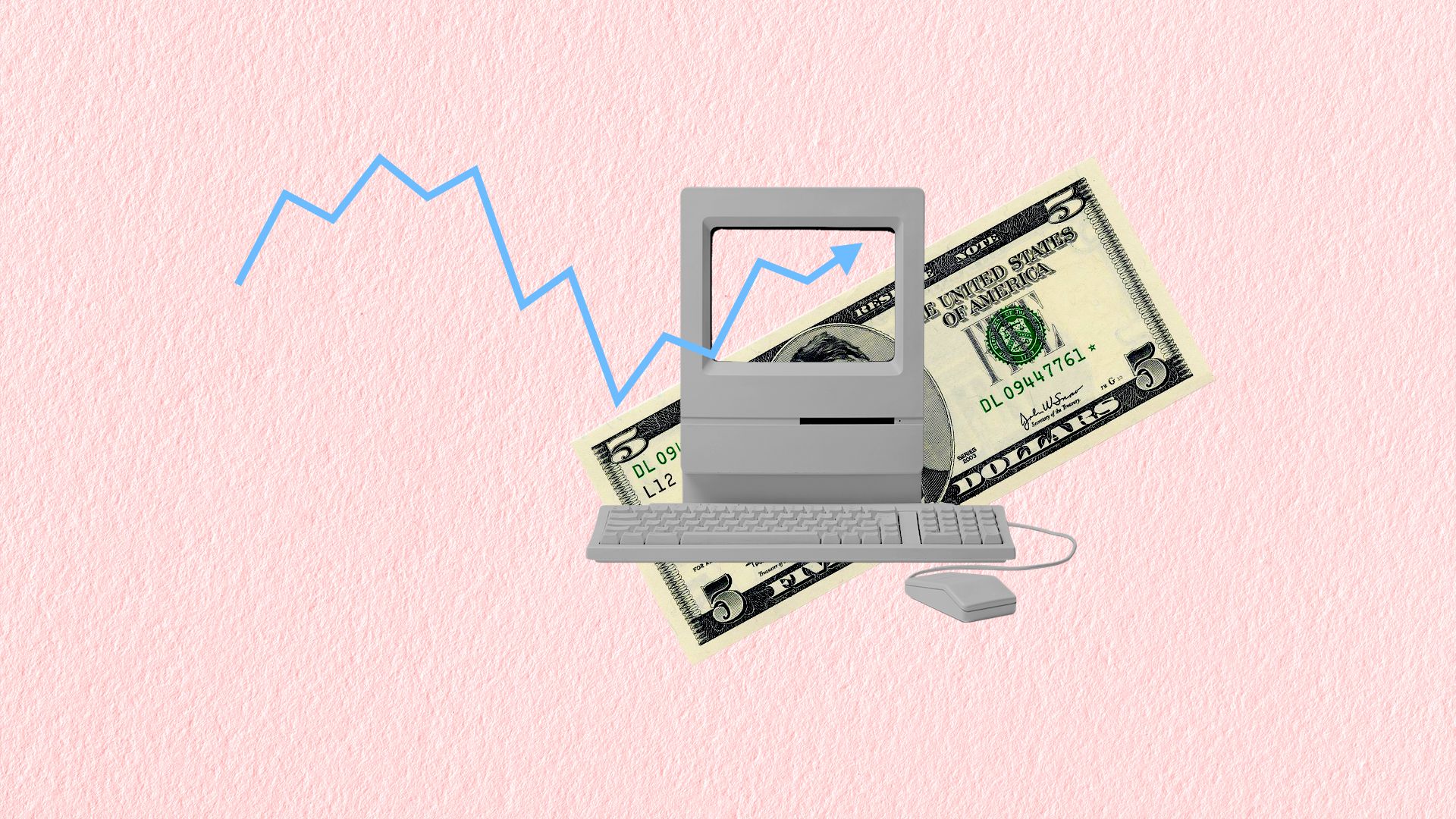Tech can't remember what to do in a down market
Add Axios as your preferred source to
see more of our stories on Google.

Illustration: Rebecca Zisser/Axios
Wall Street's two-day-old coronavirus crash is a wakeup alarm for Silicon Valley.
The big picture: Tech has been booming for so long the industry barely remembers what a down market feels like — and most companies are ill-prepared for one.
Background: The tech industry's last real experience of financial adversity was a generation ago, when the dotcom bust leveled the tech sector.
- The recession of 2001 hit Silicon Valley extra hard, while the Great Recession of 2007-2009 left it relatively unscathed.
- "RIP Good Times," an infamous presentation by Sequoia Capital in 2008, tried to warn tech of a coming downturn that barely materialized — and the following decade turned into a unicorn-breeding, billionaire-minting, IPO-launching Gilded Age for the industry.
- Today, most startups and many well-established firms are led and staffed by people who have no first-hand experience of the brutal logic of industry shrinkage.
Veterans of the dotcom collapse 20 years ago recall how it played out then.
Winners:
- ROI (return on investment) and cash revenue: Companies that don't rely on borrowed money or equity financing are in a much better position to keep the lights on.
- B2B (business-to-business): services and products with other businesses as their customers tend to fare better than companies that serve consumer markets.
- M&A (mergers and acquisitions): The lawyers and financiers who help growing companies buy out their competitors also make out like bandits in a downturn, when failing companies need to consolidate.
Losers:
- Advertising and media: Marketing budgets are easy to cut fast, and media outfits dependent on those budgets feel the pain the fastest.
- Employee activism: Layoffs spread fear among workers, job mobility and openings evaporate, companies feel less need to keep their employees happy — leaving workers without the security they need to speak out.
- Diversity and inclusion efforts: While experts say a diverse workforce is good for the bottom line, recruiting and retention efforts require investments that often get pinched in lean times.
- Idealistic mission statements: "Changing the world" gets swapped out very quickly for "Staying alive."
A coronavirus-triggered recession could affect tech in unexpected ways.
- The industry is highly dependent on international collaboration, cross-border supply chains and global consumer demand, all of which are threatened by the prospect of a pandemic.
- But a shelter-in-place mentality could prove a boon to videoconferencing, e-commerce, and other tech-driven trends that let lives go on with less direct human contact.
A market retreat could also reshape the inside-the-Beltway critique of Big Tech.
- Arguments for tough new regulations based on the industry's power might look different in a world where tech giants' stock had been battered and their spending cut, on everything from lobbying to acquisitions.
- 20 years ago, a new wave of companies (including Google, founded 1998, Salesforce, founded 1999, and Facebook, founded 2004) germinated while the giants of the era froze in place or withered.
- The big question today is whether a downturn would clear space for a new generation of startups to blossom, or just leave today's giants more deeply entrenched.
Yes, but: Two days of 3-percent-plus losses in the market don't constitute a downturn, or even, in technical terms, a market "correction" (which is defined as a 10 percent drop).
- Markets took a dive in late 2018 on recession fears, only to come roaring back.
- Today's financial world is still awash in cash, which could provide a calming buffer. The venture capital world is still looking to invest huge amounts: Per Pitchbook, funds raised a record $88.3 billion and $75.5 billion in 2018 and 2019, respectively.
- In some cases, smaller companies started laying people off even before this market drop, so they might be able to weather it more easily.
The bottom line: This week's precipitous drops remind everyone in tech that graph-lines don't alway move up as they move to the right. The alarm might wake the Valley — but the industry could also just hit "snooze."
Go deeper:
